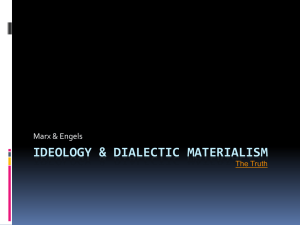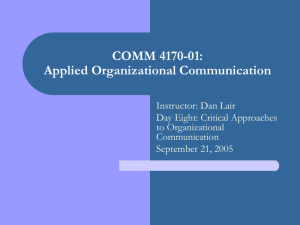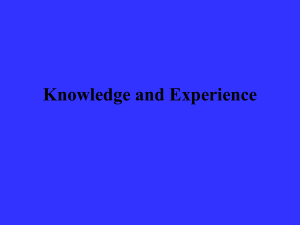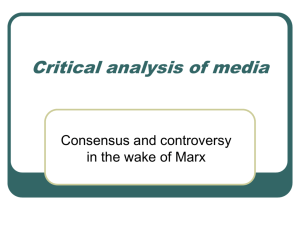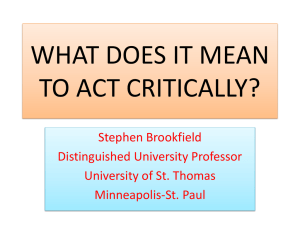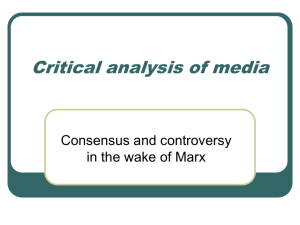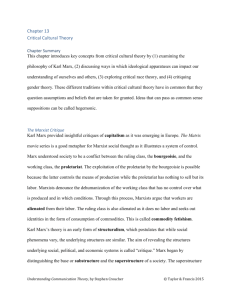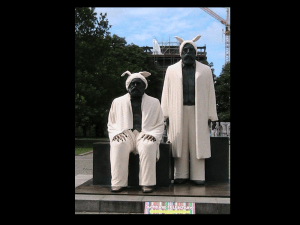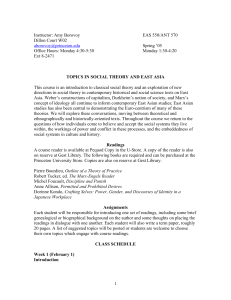Karl Marx on Religion In Marx`s vision of an ideal society
advertisement
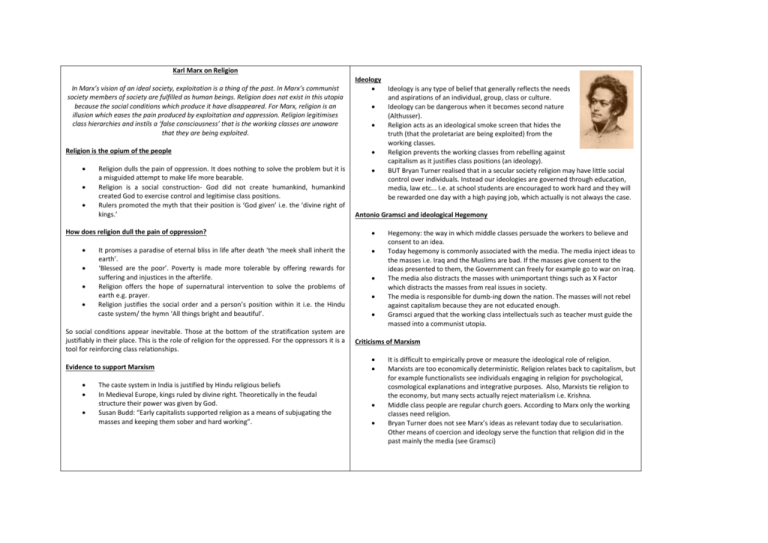
Karl Marx on Religion In Marx’s vision of an ideal society, exploitation is a thing of the past. In Marx’s communist society members of society are fulfilled as human beings. Religion does not exist in this utopia because the social conditions which produce it have disappeared. For Marx, religion is an illusion which eases the pain produced by exploitation and oppression. Religion legitimises class hierarchies and instils a ‘false consciousness’ that is the working classes are unaware that they are being exploited. Religion is the opium of the people Religion dulls the pain of oppression. It does nothing to solve the problem but it is a misguided attempt to make life more bearable. Religion is a social construction- God did not create humankind, humankind created God to exercise control and legitimise class positions. Rulers promoted the myth that their position is ‘God given’ i.e. the ‘divine right of kings.’ How does religion dull the pain of oppression? It promises a paradise of eternal bliss in life after death ‘the meek shall inherit the earth’. ‘Blessed are the poor’. Poverty is made more tolerable by offering rewards for suffering and injustices in the afterlife. Religion offers the hope of supernatural intervention to solve the problems of earth e.g. prayer. Religion justifies the social order and a person’s position within it i.e. the Hindu caste system/ the hymn ‘All things bright and beautiful’. So social conditions appear inevitable. Those at the bottom of the stratification system are justifiably in their place. This is the role of religion for the oppressed. For the oppressors it is a tool for reinforcing class relationships. Evidence to support Marxism The caste system in India is justified by Hindu religious beliefs In Medieval Europe, kings ruled by divine right. Theoretically in the feudal structure their power was given by God. Susan Budd: “Early capitalists supported religion as a means of subjugating the masses and keeping them sober and hard working”. Ideology Ideology is any type of belief that generally reflects the needs and aspirations of an individual, group, class or culture. Ideology can be dangerous when it becomes second nature (Althusser). Religion acts as an ideological smoke screen that hides the truth (that the proletariat are being exploited) from the working classes. Religion prevents the working classes from rebelling against capitalism as it justifies class positions (an ideology). BUT Bryan Turner realised that in a secular society religion may have little social control over individuals. Instead our ideologies are governed through education, media, law etc... I.e. at school students are encouraged to work hard and they will be rewarded one day with a high paying job, which actually is not always the case. Antonio Gramsci and ideological Hegemony Hegemony: the way in which middle classes persuade the workers to believe and consent to an idea. Today hegemony is commonly associated with the media. The media inject ideas to the masses i.e. Iraq and the Muslims are bad. If the masses give consent to the ideas presented to them, the Government can freely for example go to war on Iraq. The media also distracts the masses with unimportant things such as X Factor which distracts the masses from real issues in society. The media is responsible for dumb-ing down the nation. The masses will not rebel against capitalism because they are not educated enough. Gramsci argued that the working class intellectuals such as teacher must guide the massed into a communist utopia. Criticisms of Marxism It is difficult to empirically prove or measure the ideological role of religion. Marxists are too economically deterministic. Religion relates back to capitalism, but for example functionalists see individuals engaging in religion for psychological, cosmological explanations and integrative purposes. Also, Marxists tie religion to the economy, but many sects actually reject materialism i.e. Krishna. Middle class people are regular church goers. According to Marx only the working classes need religion. Bryan Turner does not see Marx’s ideas as relevant today due to secularisation. Other means of coercion and ideology serve the function that religion did in the past mainly the media (see Gramsci)
